THE SMALL BU; ■ TER IN LONDON.
Page 18
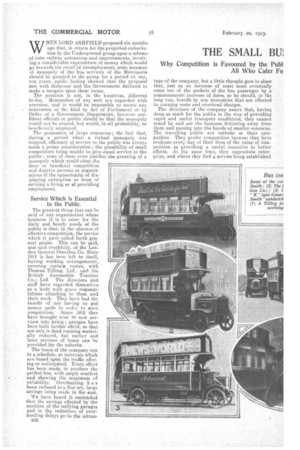
Page 19
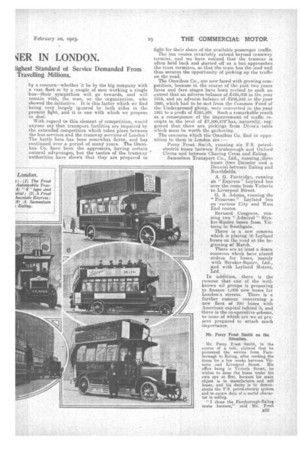
Page 20
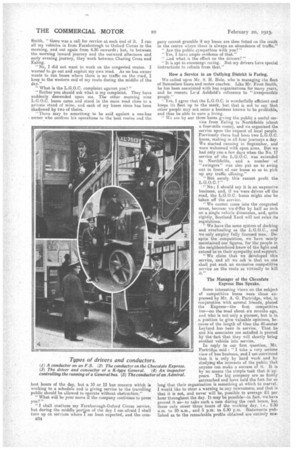
Page 21
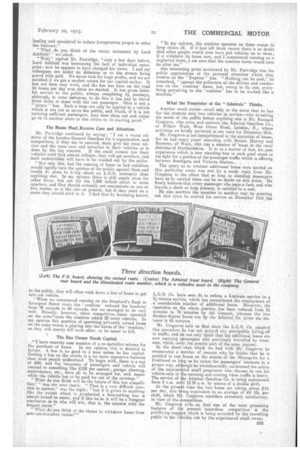
Page 22
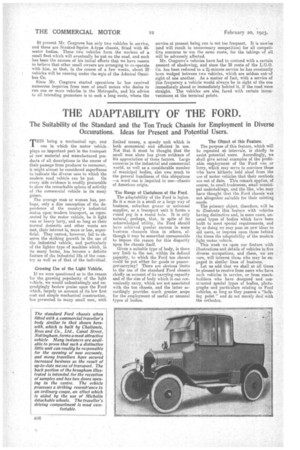
If you've noticed an error in this article please click here to report it so we can fix it.
WHEN LORD ASHFIELD proposed six months ago that, in return for the projected embarkation by the Underground group upon a scheme of tube railway extensions and improvements, involving a considerable expenditure of money which would go towards the reiief of unemployment, some measure of monopoly of the bus services of the Metropolis should be granted to the group for a period of, say, ten years, public feeling showed that the proposal met with disfavour and the Government declined to make a bargain upon those terms.
The position is not, in the leastwise, different -to-day. Monopolies of any sort are regarded with aversion, and it would be impossible to secure any concession of the kind by Act of Parliamentor by Order of a Government Department, however confident officials or public should be that the monopoly ,would not be abused, but would, in all probability, be beneficently employed. .
The possession of large resources ; the fact that, during a period when a virtual monopoly was enjoyed, efficiency of service to the public was always made a prime consideration ; the possibility of small competitors being unable to give equal service to the public ; none of these even justifies the granting of a monopoly which would dose the door _to beneficial competition and deprive persons or organizations of the opportunity of displaying enterprise or even of earning FL living or of providing employment.
Service Which is Essential to the Public.
The greatest thing that can he said of any organization whose business it is to cater for the daily and hourly needs of the public is that, in the absence of effective competition, the service which it gave called forth general praise. This can be said, and said truthfully, of the London General Omnibus Co. Since 1912 it has been left to itself, having working arrangements, covering certain routes, with Thomas Tilling, Ltd., and the British Automobile Traction Co.; Ltd. The directors and Staff have regarded themselves as a body with grave responsibilities attaching to them and their work. They have had the .benefit of not having to plA money aside in order to meet competition. Since 1912 they have brought over 80 new services into being ; garages have been built farther afield, so that not only is dead running materially reduced, but earlier and later services of buses can he provided for the suburbs.
The buses of the company run to a schedule, at interyals which are based upon the traffic offering or anticipated. Every effort has been made to produce the perfect bus, with ample comfort and showing the maximum of reliability. Overhauling h a s been reduced to-a fine art, large savings being made in the @oat.
We have heard it contended
that the savings effected by the erection of the outlying garages
and in the reduction of overhauling delays go to the advanB32
tage of the company, but a little thought goes to show that, just as an increase of costs must eventually come out of the pockets of the bus passenger by a commensurate increase of fares, so he should, in the long run, benefit by any economies that are effected in running costs and overhead charges. The directors of the company assert that, having done so much for the public in the way of providing rapid and useful transport conditions, they cannot stand by and see the business frittering away from them and passing into the hands of smaller concerns. The travelling public are catholic in their sympathies They prefer competition because they have evidence every day of their lives of the value of competition as providing a useful incentive to better efforts. At the same time, they appreciate enterprise, and where they find a service being established
by a concern—whether it he by the big Company with a vast fleet or by a couple of men working a single bus—their sympathies will go towards, and will remain with, the man, or the organization, who showed the initiative. It is this factor which we find being very largely igaored by both sides in the present fight, and it is one with which we propose to deal.
With regard Is this element of competition,. would anyone say that transport facilities are impaired by the extended competition which takes place between the bus services and the tramway services of London? The battle here has been somewhat fierce, and has continued over a period of many years. The Omnibus Co. have been the aggressors, having certain natural advantages, but the tactics of the tramway authorities have shown that they are prepared to fight for their share of the available passenger traffic.
The bus routes invariably extend beyond tramway termini, and we have noticed that the tramcar is often held back and started off as a bus approaches the tram terminus, so that the train has the lead and thus secures the opportunity of picking up the traffic on the road.
The Omnibus Co., are now faced with growing competition, because in the course of the past twe years fares and fare stages have been revised to such an extent that an adverse balance of 2424,003 in the year 1919, and an adverse balance of £288,042 in the year 1920, which had to be met from the Common Fund of the Underground gioup, were converted in the year 1921 to a profit of S:595,568. Such a remarkable result as a consequence of the improvement of traffic receipts to the level of 27,500,572'has, naturally, sag: gested that there are pickings from Dives's table which must be worth the gathering.
The concerns which the Omnibus Co. find in opposition to them in London are :— Percy Frost Smith, running six F.S. petrolelectric buses between Farnborough and Oxford Circus and between Charing Cross and Ealing.
Samuelson Transport td., running,three buses Co.,Vwo Daimler and a Dennis) between Ealing and Northfields.
A. G. Partridge, running " Express " Leyland bus over the route from Victoria to Liverpool Street.
G. A. Adams, running the " Primrose " Leyland bus on various City and West End routes.
Bernard Cosgrove, running two " Admiral " Straker-Squire buses from Victoria to Southgate.
There is a. new concern which is placing 10 Leyland buses on the road at the beginning of March.
There are at least a dozen concerns which have placed orders for buses, mainly with Straker-Squire, Ltd., and with Leyland Motors, Ltd.
In addition, there is the rumour that one of the Wellknown oil groups is preparing to finance 1,000 new buses for London's streets. There is a further rumour concerning A. new fleet of 250 buses with American capital behind it, and there is the co-operative scheme, to none of which are we at present prepared to attach much importance.
Mr. Percy Frost Smith on the
Situation.
Mr. Percy Frost Smith, in the course of a talk, claimed that he pioneered the service from Farnborough to Ealing, after running the buses for a few weeks between Victoria and Liverpool Street. His office being in Victoria Street, he wishes to keep the buses under his own eye at first, because his main object is to manufactures and sell buses, and his desire is to demonstrate the F.S. petrol-electric system and to secure data of a useful character in selling.
"r chose the Farnborough-Ealing route because," said Mr. Frost B33 Smith, "there was a call for service at each end of it. I run all my vehicles in from Farnborough to Oxford Circus in the morning, and out again from 4.30 onwards; but, in between the morning inward journey and the outward afternoon and early evening journey, they work between Charing Cross end "No, I did not want to work on the congested routes. I wanted to go out and exploit my own road. As no bus owner wants to run buses where there is no traffic on the road, I keep to the western end of my route during the middle of the day."
" What is the L.G.O.C. complaint. against you?" "Rather you should ask what is my complaint. They have suddenly descended upon me. The other morning nine L.G.0.0. buses ca.me. and stood in the main road close to a private stand of mine, and each of my buses since has been shadowed by two of theirs. "There may be something to be said against a one-bus owner who confines his operations to the best routes and the
best hours of the day, but a 10 or 12 bus concern which is working to a schedule and is giving service to the travelling public should be allowed to operate without obstruction."
"What will be your move if the company continues to press yon?"
"I shall continue my Farnborough-Oxford Circus service, but during the middle portion of the day I am afraid I shall turn up on services wherel am least expected, and the corn B34 pany cannot grumble if my buses are then found on the roads in the centre where there is always an 'abundance of traffic.""Are the public sympathies With you?" "Yes, I have ample evidence of that."
" /and what is the effect on the drivers?"
"It is apt to encourage racing. But my drivers have special instructions to iefrain from that."
How a Service in an Outlying District is Faring.
We called upon Mr. S. H. Hole, who is managing the fleet of Samuelson buses and motor coaches. Like Mr. Frost Smith, he has been associated with bus organizations for many years, and he resents Lord Ashfield's reference to "irresponsible people.'• " Yes, I agree that the L.G.O.C. is wonderfully efficient and keeps its fleet up to the mark, but that is not to say that other people may not. enter a business known to be profitable, and thus be able to earn a living.
" We are by our three buses giving the public a useful service from Ealing to Northfields (about a four-mile route), and we organized the service upon the request of local people. Previously there had been two L.G.O.C. buses, making in all four journeys a day. *e started running in September, and were welcomed with open arms. But we had only run a few days when the No. 17 service of' the L.G.O.C. was extended to Northfields, and a number of "swingers" was also put on to swing out in front of our buses so as to pick up any traffic offering."
But surely this cannot profit the L.G.O.C.?"
" No; I should say it is an expensive business, and, if we were driven off the road, the L.G.O.C. buses might also be taken off the service.
" We cannot come into the congested areas, because we differ by half an inch on a single vehicle dimension, and, quite rightly, Scotland Yard will not relax its regulations.
" We have the same system of docking and overhauling as the L.G.O.C., nnd we only employ fully licensed men. Despite the competition, we have nearly maintained our figures, for the people in the neighbourhood know of the fight and extend to us their sympathy and support. " We claim that we developed this service, and all we ask is that no one shall put such an excessive competitive service on the route as virtually to kill it."
The Manager of the Chocolate Express Bus Speaks.
Some interesting views on the subject of competitive buses were those expressed by Mr. A. G. Partridge, who, in conjunction with several friends, placed the Express—the first competitive bus—on the road about six months ago, and who is not only a pioneer, but is in a. position to give valuable opinions, be. cause of the length of time the 48-seater Leyland has been in service. That he and his associates are satisfied is proved by the fact that they will shortly bring another vehicle into service.
In reply to our first question, Mr. Partridge. said : ".I take a very serious view of bus business, and I nun convinced that it is only by hard work and by studying,ihe interests of the public that anyone can make a success of it. It is by no means the simple task that it appears. The big company are so firmly entrenched and have held the fort for so long that. their organization is something at which to marvel. I would like to utter a warning to any newcomers, and that is that it, is not, and never will be, possible to average 21. per hour throughout the day. It may be possible—in fact, we have proved it so—to take such a sum during the rush hours, but these only cover three hours of the working day, i.e., 8.30 a.m. to 10 a.m., and 5 p.m. to 6.30 p.m. Statements published as to the remarkable profits obtained are entirely m's
leading and calculated to induce irresponsible people to enter the business."
"What do you think of the recent statement by Lord Ashfield? " we asked.
"Well," replied Mr. Partridge, "only a few days before, Lord .Ashfield was bemoaning the lack of individual enterprise; now he appears to have changed his views. I and my colleagues are under no delusions as to the streets being paved with gold. We never look for huge profits, and we are aatisfied if we get a modest return for our capital outlay. It has not. been easy work, and the bus has been on the road 16 hours per day ever since we started. It has given faithful service to the public, always completing its journeys, although, in some instances, to do this it has had to travel three miles or more with but one passenger. Ours is not a "pirate" bus. Such a term can only be applied to a. vehicle which is not out to serve the public, and which, if it is not carrying sufficient passengers, may turn them out and either go on to another route or else return to its starting point."
The Buses Must,Receive .Care and Attention.
Mr. Partridge continued by saying; "I am a warm admirer of the London General Omnibus Co.'s organization, and competitors, if they are to succeed, must give the same service and the same care and attention to their vehicles as is done by the big concern. If the small owners run their vehicles until they almost collapse, they will get nowhere, and such undesirables will have to be weeded out by the police.
"Not only this, but the running of buses in bad cohdition would rapidly turn the opinion of the public against them and would de • more to bring about an L.G.O. monopoly than anything else. In my opinion there is still ample room for other limes, but not for the 1,000 talked about in some quarters, and they should certainly not concentrate on one or two routes, as is the case at present, but if they start on a route they should stick to it. I find that by becoming known to the public, they will often walk down aline of lenses to get into our vehicle.
"When we (ommenced running on the Shepherd's Bush to Liverpool Street route the combine' reduced the headway front 90 seconds to 60 seconds, but. we managed to do very well. Directly, however, other competitive, buseS operated on the same route the combine added 20 more vehicles. In my opinion this question of operating privately owned buses on the same routes is playing into the hands of tho 'combine,' as they will merely kill each other, or be easier to kill.
The Bus Owner Needs Capital.
." I have recently seen mention of a co-operative scheme for the purchase of buses. In my opinion this is doomed to failure. A has is no good to a man unless he has capital. Getting a bus on tie streets is a far more expensive business than most people understand. To begin with, there is a tax of £84, and the insurance of passengers nod vehicle will amount to something like £100 per annum ; garage, cleaning, maintenance, etc., have all to be arranged for, and, meanwhile the vehicle has ta be paid for out of the earnings." "What do you think will be the future of this bus competition? " was our next query. " Tba,t is a very difficult question to answer," was the reply; "hut if it grows to anything like the extent which is prophesied a fare-cutting war is almost hound to ensue, and if this be to it will be a foregone conclusion as to who will win, that is, the concern with the longest nurse."
" Whet do you think of the threat to withdraw buses from nonrem en erateve rontas ? " "In my opinion, the combine operates on these routes to keep others off. If it-had left them vacant there is no doubt that other people would soon have put vehicles on to them; if it withdrew its buses now, and I commenced running on a neglected route, I am sure that the combine buses would soon be after me. " '
One interesting point mentioned by Mr. Partridge was the public appreciation of the personal attention which they reoeive on the "Express" bus. "Nothing can be said," he remarked, "against the politeness of the drivers and conductors on the 'combine' buses, but, owing to its size, everything pertaining to the 'combine' has to be weeked like a machine."
What the Proprietor of the "Admirals" Thinks.
Another small owner—small only in the sense that he has i for the moment only two vehicles n service—who isesetting the needsof the public before anything else is Mr. Esarnard Cosgrove, who owns and controls the Admiral Omnibus Co., of Willow Walk, West Green Road, London, N., whose activities we brietly reviewed in our issue for December 26th.
Mr. Cosgrove is not inexpe-rienced in the operation of buses, for he had many years' 'sehooling with Messrs. Harvey and Burrows, of Ware Who rtin a number Of buses in the rural districts of Hertfo;dshire. It is, as a matter of fact, his past experience which is now standing him in such good stead in his fight for a portion of the passenger traffic which is offering between Southgate and Victoria Stations
The query as to whether additional buses were needed on this particular route was met by a ready reply from Mr. Cosgrove to the effect that so long as standing passengers have to be carried there can be no doubt on this point. He firmly believes that every passenger who pays a fare, and who travels a short or long journey, is entitled to a seat.
He also answers the question in another way by pointing out that since he started his service on December 14th the L,Ce0. Co. have seen fit to reduce a 5-minute service to a 2i-minute service, which has necessitated the employment. of . a considerable /Amber of additional buses. Moreover, the timetable on the whole journey. has been reduced from 81 minutes to 76 minutes by the General, whereas the two Straker-Squire buses run by the Admiral. Co. cover the distame' in 65 minutes.: Mr. Cosgrove( tells us that since the L.G.O. Co. adopted this procedure lie hike not noticed any perceptible falling-off in traffic, and he can only think that the additional buses are now carrying pessengers who previously travelled by tramcars, which cover the greater part of the same journey.
In the short chat which we had with Mr. Cosgrove Ike enumerated a number of reasons why he thinks-that he is entitled to run buses on the streets of the Metropolis for a livelihood so to g as he caters for passengers' interests in a proper way, alt ugh he wholeheartedly condemned the action of the unprinel led small proprietor who chooses to run his
• vehicle only in he morning and evening when traffic is heavy. The service a he Admiral Omnibus Co. is being maintained from 8 a.m. un il 12.30 a.m, by means of a double shift.
At the prese t time the two buses are taking about £18 per day, this b ing•equivalent to an average of RA 108. per shift, which M . Cosgrove considers extremely satisfactory, in view of the ompetffion. Mr. Cosigrov tells .us that one of the most promising features of t e present hazardous competition is the gratifying sup rt which is being accorded by the travelling public to the v hides run by the experienced small owner. At present Mr. Cosgrove has only two vehicles in service, and these are Straked-Squire A-type chassis, fitted with 44seater bodies. These two vehicles form the nucleus of a small fleet which will eventually be'put on the road, and such has been the success of his initial efforts that we have reason to believe that other small owners are arranging to co-operate with him, so that, in the course of a few weeks, about 20 vehicles will be running under the aegis of the Admiral Omnibus Co.
Since Mr. Cosgrove started operations he has received numerous inquiries from men of small means who desire to run one or more vehicles in the Metropolis, and his advice to all intending promoters is to seek a long route, where the service at present being run is not too frequent. It. is unwise (and will result in unnecessary competition) for all competitive concerns to use the same route, for the takings of all will be adversely affected. Mr. Cosgrove's vehicles have had to contend with a certain amount of shadowing, and since the 29 route of the L.G.O. Co. has been reduced to a 2-minute service he has constantly . been wedged between two vehicles, which are seldom out:of sight of one another. As a, matter of fact, with a service of this frequency a vehicle would always be in sight of the gne immediately ahead or immediately behind it, if the road were straight. The vehicles are also fated with certain inconveniences at the terminal points.






























